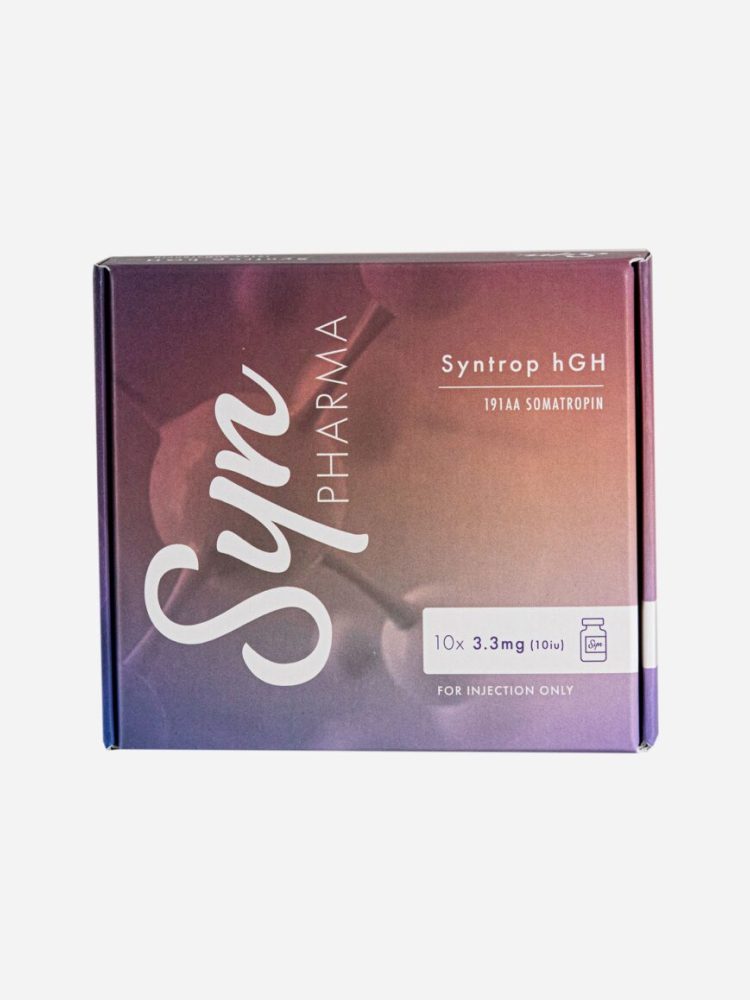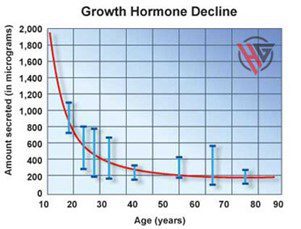No products in the cart.
Back 

In stock
Human Growth Hormone, 10x10IU
$430.00
SKU: 29045-SB-9-35
Categories: Men’s Health, Peptides, Repair and Recovery
Injectable
Indications – Immune boosting, anti-inflammatory, anti-oxidant, increased endurance
Human Growth Hormone (hGH) has been called a miracle anti-aging drug, and it is now being used to vastly increase the quality of life in the aging population, help athletes recover from injury and increase performance. Studies have shown significant improvement in muscle, fat, bone and skin as well as improved cholesterol levels, mood, libido and a general sense of well-being with hGH treatment. hGH optimization along with a proper diet and nutrition program is the ideal program to maximize health and longevity.
- Description
- Reviews (0)
Human Growth Hormone
Human Growth Hormone (hGH) has been called a miracle anti-aging drug, and it is now being used to vastly increase the quality of life in the aging population, help athletes recover from injury and increase performance.o
Are you tired, putting on weight, feeling depressed? Do you work out, but find you cannot build muscle like you used to? Are you even having some trouble in the bedroom?
There is a good chance that you are feeling the impact of declining levels of human growth hormone or HGH, and could benefit from growth hormone therapy.
Human Growth Hormone (HGH) is a natural anabolic hormone secreted by the pituitary gland. Growth hormone levels peak in adolescence but decline as we age.
There have been many well documented benefits of HGH hormone therapy. In 1990, Daniel Rudman, MD, published a landmark study that was the first to show the benefits of HGH for adults. The study, which was published in the prestigious New England Journal of Medicine, clearly showed the benefits of HGH, including increased muscle tone, loss of fat, and regenerated skin quality.
Do you Need HGH therapy?
Ask yourself these questions…
Is my abdomen flabby?
Are my muscles slack and weak?
Do I have sleep problems?
Have I experienced weight gain?
Is my hair thinning?
Do I feel exhausted most of the time?
Is recovery after exercise too long?
Hormone deficiencies are very prevalent in our society and can lead to age-related chronic diseases facing many Canadians. When your hGH levels decline your body fails to function properly leading to many health complications such as loss of muscles (sarcopenia), bone (osteopenia) and skin as well as excess fat accumulation. These issues can be reversed by supplementing hGH.
Replacing deficiencies promotes wellness, can reduce risk factors for disease, and enhance the quality of life.
HGH Benefits
- Builds muscle
● Enhances immune function
● Strengthens the heart
● Helps control stress-induced damage
● Increases athletic performance
● Speeds up the healing process from injury
● Increase energy levels
● Decreased fat accumulation
Studies have shown significant improvement in muscle, fat, bone and skin as well as improved cholesterol levels, mood, libido and a general sense of well-being with hGH treatment. hGH optimization along with a proper diet and nutrition program is the ideal program to maximize health and longevity.
Are you tired, putting on weight, feeling depressed? Do you work out, but find you cannot build muscle like you used to? Are you even having some trouble in the bedroom?
There is a good chance that you are feeling the impact of declining levels of human growth hormone or HGH, and could benefit from growth hormone therapy.
Detailed Product Description
What is human growth hormone (hGH)?
Human growth hormone, also known as hGH and somatotropin, is a natural hormone your pituitary gland makes and releases that acts on many parts of the body to promote growth in children. Once the growth plates in your bones (epiphyses) have fused, hGH no longer increases height, but your body still needs hGH. After you’ve finished growing, hGH helps to maintain normal body structure and metabolism, including helping to keep your blood sugar (glucose) levels within a healthy range.
Hormones are chemicals that coordinate different functions in your body by carrying messages through your blood to your organs, muscles and other tissues. These signals tell your body what to do and when to do it. Your body makes over 50 hormones, and many of them interact with each other, creating a complex web of processes.
Your pituitary gland is a small, pea-sized endocrine gland located at the base of your brain below your hypothalamus. It’s made of two lobes: the anterior (front) lobe and posterior (back) lobe. Your anterior lobe makes hGH.
Your pituitary gland is connected to your hypothalamus through a stalk of blood vessels and nerves. This is called the pituitary stalk. Your hypothalamus is the part of your brain that controls functions like blood pressure, heart rate, body temperature and digestion. Through the stalk, your hypothalamus communicates with your pituitary gland and tells it to release certain hormones. In this case, your hypothalamus releases growth hormone-releasing hormone (GHRH), which stimulates your pituitary gland to release hGH, and somatostatin, which prevents (inhibits) that release.
Healthcare providers use a synthetic form of hGH (sometimes called recombinant hGH) to treat certain health conditions, including growth hormone deficiency.
What triggers the production of human growth hormone (hGH)?
Your pituitary gland normally releases hGH in short bursts (pulses) throughout the day. The release of hGH is mainly controlled by two hormones your hypothalamus releases: growth hormone-releasing hormone (GHRH), which stimulates hGH release, and somatostatin, which prevents (inhibits) hGH release.
Several other endocrine hormones also regulate hGH, including insulin-like growth factor 1 (IGF-1). IGF-1 is a major suppressor of GH production, whereas thyroxine, glucocorticoids and ghrelin stimulate hGH release.
IGF-1 that’s released by your liver is one of the best-characterized effects of hGH activity. IGF-1 plays a critical role in preventing (inhibiting) the release of the hGH through a negative feedback loop by stimulating somatostatin and inhibiting GHRH release. However, hGH and IGF-1 secretion are regulated by each other, where HGH triggers IGF-1 release and the IGF-1 inhibits HGH release in a feedback loop. In healthy people, hGH release is inhibited by hyperglycemia (high blood sugar) and stimulated by sleep, stress, exercise, hypoglycemia (low blood sugar) and amino acids.
What is the function of human growth hormone (hGH)?
Human growth hormone has two main functions: stimulating growth (mainly in children) and impacting metabolism (how your body turns the food you eat into energy).
hGH and growth
Human growth hormone triggers growth in nearly every tissue and organ in your body. However, it’s most well-known for its growth-promoting effect on cartilage and bone, especially in the adolescent years during puberty. Cells in cartilage called chondrocytes and cells in bones called osteoblasts receive signals from hGH to increase replication and thus allow for growth in size.
Once the growth plates in a child’s bones have fused, hGH no longer increases height. Instead, hGH helps to maintain normal body structure throughout the rest of your life.
hGH and metabolism
Metabolism consists of the chemical reactions in your body that change the food you eat into energy. All of the cells in your body need energy to function properly. Several different complex processes are involved in metabolism.
hGH impacts metabolism primarily by increasing the production of insulin-like growth factor-1 (IGF-1) and its effect on cells in your body. IGF-1 is a hormone similar in structure to insulin that manages the effects of hGH in your body. Insulin is an essential hormone your pancreas makes that helps regulate your blood sugar (glucose) levels by decreasing them. Like insulin, IGF-1 has glucose-lowering effects.
Your body normally carefully regulates your blood glucose levels. Blood glucose, or sugar, is the main sugar found in your blood. You get glucose from carbohydrates in the food you eat. This sugar is an important source of energy and provides nutrients to your body’s organs, muscles and nervous system.
Insulin is the main hormone your pancreas makes to lower blood glucose levels when they get too high, and glucagon is the main hormone your pancreas makes to raise glucose levels when they get too low. Other hormones can counteract the effects of insulin, such as epinephrine (adrenaline) and cortisol.
While hGH normally increases blood glucose levels when they get too low, if you have excess amounts of hGH in your body, it can counteract the effects of insulin, causing elevated blood glucose levels.
What are normal levels of human growth hormone (hGH)?
Your pituitary gland releases hGH in pulses. The size and duration of the pulses vary with the time of day and your age and sex. Because of this, random hGH measurements are rarely useful to healthcare providers in confirming or ruling out a diagnosis. Instead, hGH measurement tests are most useful when measured as part of a stimulation or suppression test.
In general, the normal range for HGH levels include:
For adult males: 0.4 to 10 nanograms per milliliter (ng/mL), or 18 to 44 picomoles per liter (pmol/L).
For adult females: 1 to 14 ng/mL, or 44 to 616 pmol/L
Normal value ranges may vary from lab to lab. Be sure to reference your lab’s normal range on your lab report when analyzing your results. If you have any questions about your results, talk to your healthcare provider.
What happens when human growth hormone (hGH) levels are too low?
Having lower-than-normal levels of hGH is called growth hormone deficiency. It’s usually due to an issue with or damage to your pituitary gland that results in hypopituitarism — when one, several or all of the hormones your pituitary gland makes are deficient. Human growth hormone could be one of the affected hormones.
hGH deficiency in adults
When adults have a lack of hGH, it causes the following issues:
- Reduced sense of well-being.
- Increased body fat.
- Increased risk of heart disease.
- Weak heart, muscles and bones.
In adults, hypopituitarism that results in hGH deficiency may develop due to a benign pituitary adenoma (a noncancerous tumor) or damage to your pituitary gland or hypothalamus





Reviews
There are no reviews yet.